Do Puppies Outgrow Separation Anxiety?
December 30, 2021 2021-12-30 6:34Separation anxiety is when dogs feel intense distress being apart from their owners. It’s very common and a lot of puppies suffer from it, but it won’t go away by itself. Thankfully, there are several things you can do to stop separation anxiety in its tracks, but first, we need to understand it.
Table of Contents
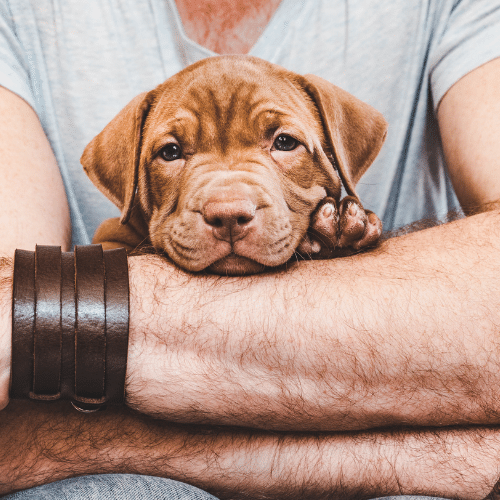
Why do puppies get separation anxiety?
Puppies tend to get separation anxiety because they lack independence. Everything is new and scary, but you, as their owner, are the one constant, and so they cling to you for protection.
Most young pups have also never really spent time alone; they likely spent the first 8 weeks of their lives with their mothers and siblings before they went home with you, and so being by themselves is brand new territory.
Understimulation can also contribute to separation anxiety. When dogs get bored or underworked, they can get frustrated and anxious about being alone. With young pups, it’s even worse because they have so much energy and it’s hard to expend it all without overworking them.
Is separation anxiety normal in puppies?
Most puppies will have some anxiety about being alone at first, but this is only natural and should fade with time. However, a little anxiety is not the same as full-blown separation anxiety, which is not healthy and must be addressed. That said, it is relatively common, with around 14% of dogs experiencing it in the US.
Do puppies grow out of separation anxiety?
Unfortunately, puppies don’t just grow out of separation anxiety. If you leave it untreated, it will likely just get worse, and it certainly won’t get any better! However, thankfully, it’s not too difficult to treat and just takes a little TLC and training.
Which puppies get separation anxiety?
Any puppy can get separation anxiety, but it’s more likely to occur in breeds with high energy, high intelligence, intense personalities, and high social needs because they require a little more stimulation than other dogs.
Border Collies and Labradors are known to be the worst offenders. Certain breeds, such as Vizlas are also naturally clingier than others.
What age do puppies get separation anxiety?
Puppies can develop separation anxiety at any age, it all depends when what is causing their anxiety. However, they are less likely to develop it if you begin proper separation training at an early age. The earlier, the better!
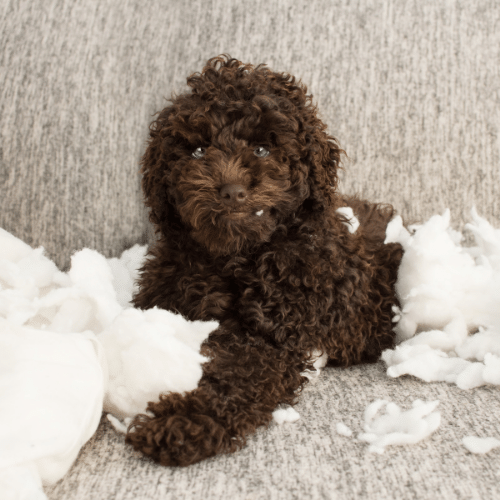
What does separation anxiety look like in puppies?
Separation anxiety can cause destructive behaviors in dogs. Most often, it causes them to destroy their beds and toys, as well as furniture and other household items whenever you leave the house. They may also bark and whine excessively, try to escape the home, and go to the toilet indoors.
In extreme cases, they might also harm themselves with excessive scratching, licking, and biting. An anxious pup might also pace, pant, drool, shake, have tummy upsets, or repeat certain behaviors.
It’s important to recognize the difference between these behaviors and regular puppy behaviors because they can be similar. For example, all teething puppies destroy their possessions and try to chew household furniture, but unless it is accompanied by other signs and symptoms, it’s probably normal teething behavior.
How to react to destructive anxiety in puppies
If your puppy is destructive when you leave the house, don’t react angrily. You should never punish a dog for anxious behavior. Although it’s frustrating, it is not their fault. Puppies with separation anxiety are also desperate for attention, so reacting like that may actually encourage their behavior.
Not only that, but they are too young to understand why you’re upset, so it would just frighten them and ruin your bond. It could even make them feel threatened and cause an aggressive reaction. It is far more effective to show them that this kind of behavior doesn’t get any attention from you. And don’t forget to praise them when they get it right!
How to do separation training with your puppy
In order to prevent or put a stop to separation anxiety in puppies, you need to build their independence gradually and create positive associations through separation training.
You can do this by introducing alone time slowly. First, leave the house for a small amount of time like 5-10 minutes. Don’t make a big deal out of leaving, as this can encourage feelings of anxiety. Instead, make a big fuss of them when you come back to give your dog something to look forward to next time you go out.
Then, the next day, leave for slightly longer and continue to expand your time apart. This builds trust with your dog that you will always come back.
To make a positive association with spending time alone, encourage solo play with treat dispenser balls. Then, when you go out, try leaving your pup with the toy, so long as it’s safe to do so. Not only will this be fun, kill some time, and occupy their minds, but chewing and playing with toys are massive stress relievers for dogs, too.
It’s also a good idea to desensitize your pup to certain indicators of separation. If they are old enough to recognize patterns and anticipate your actions, try doing things that you would normally do before leaving the house, such as putting on your coat. Then, instead of leaving, sit down and watch TV or play with your pup. This shows them that your actions are nothing to worry about and will relieve some anticipatory anxiety.
If your puppy’s anxiety is severe, you could try using an anti-anxiety pet product. Many owners of young pups find giving their pup a toy with a heartbeat helpful. They mimic being with siblings and reduce loneliness. You can also get anti-anxiety supplements and plug-in diffusers that contain natural soothing ingredients like CBD and lavender.
How long does separation training take?
How long separation training will take depends on the severity of your puppy’s anxiety. However, if you work on it every day, you should start to see a difference in your pup’s separation anxiety within weeks.
Hyperactivity & separation anxiety in puppies
As mentioned above, under-stimulation can contribute to separation anxiety, but it’s important not to overexercise your pup as this can interfere with their physical development. So – how can you work out your pup without overworking them?
Puppies typically need 5 minutes of exercise per month of their age twice a day until they are adults. However, some pups are so energetic that this can seem like it just isn’t enough.
To make walks as stimulating (and tiring) as possible, try to vary the location and include some fun activities like running, paddling or swimming, and playing fetch. You should also try to interact with as many friendly people and dogs as possible.
Exercising the mind is just as important and oftentimes, even more tiring than going for walks. Not only does it improve your pup’s overall wellbeing, but it also leaves a lot less space in the mind for anxiety. Toys, games, and learning new things are all great ways of stimulating your puppy’s mind.
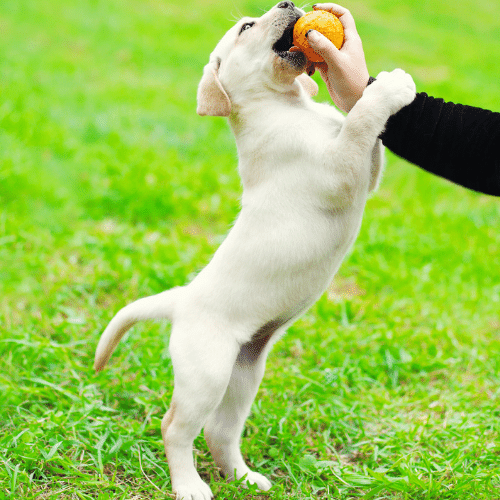
With older pups that have mastered the basics of training, you can start to play games like treasure hunt and hide and seek. To play hide and seek, simply ask your pup to sit and stay while you hide somewhere in the home. Then, call them to come and find you. Treasure hunt follows the same rules but involves hiding toys and treats instead.
With the younger pups, fetch, chase, and tug are always firm favorites, but you can turn anything into a game with youngsters. They can have hours of fun playing with a tub of water in the garden, bubbles, or playing with anything that lights up or makes a fun noise.
Puzzle toys are great for grown-up dogs, but they might be a little too advanced for some puppies. However, you can try treat-dispenser balls, slow feeders, snuffle mats, and toys that stimulate the senses.
If you’ve taught your pup all of their basic training, try teaching them some fun tricks, such as rollover, dance moves, acrobatics, or weaving through your legs. You could even try teaching them the names of some of their toys. For help with trick training, visit our page on dog tricks to get started!
How to make sure your puppy is safe when they’re home alone
Young puppies should always be left confined to a small, safe area of the home using a crate or dog gate, with enough room to stand up, lie down, and move about. This protects them from having accidents and household hazards.
Once they understand the rules, you can start to leave them unconfined in the home. This is different for every dog and entirely dependent on their personality and training. For some dogs, it can take 6-8 months, for others it’s 12.
When you leave the house for long periods of time, you should make sure your pup has access to their bed, some drinking water, and preferably, some toys.
How long can I leave my puppy home alone?
How long you can leave your puppy alone at home depends on their exact age. Young pups can hold their bladder for around one hour per month of their age up until they are 6 months old. So it’s best to follow this rule when deciding how long to leave your pup alone.
The UK’s leading dog charity Dog’s Trust recommends that you do not leave a pup over the age of 6 months alone for more than four hours at a time.
What if I need to leave my puppy alone for too long?
If you need to go out and leave your puppy alone for longer than you would like to, ask somebody you trust to come over and look after them. Or, take your pup over to their house if possible.
If you will be out all day on a regular basis, you need to be sure that a puppy is right for you, and that you can make the most of your time together when you are at home. See if you can make special arrangements to include your dog, and if that’s not possible, you could hire a dog sitter or enquire about a local doggy daycare.
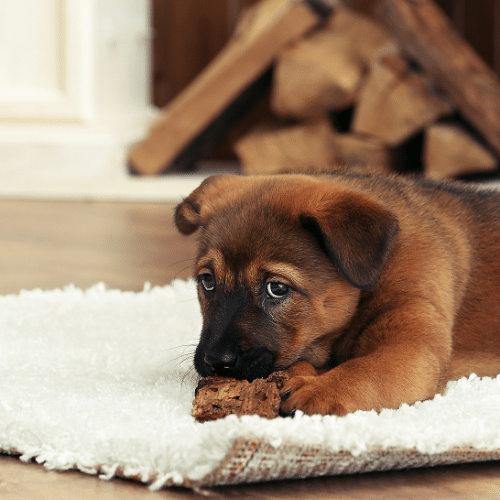
Can trauma cause separation anxiety in puppies?
Puppies can develop separation anxiety suddenly after they are exposed to something traumatic, for example, a frightening storm. Where this is the case, be sure to give your pup lots of attention and affection, fill their days with play and long walks, and try to provide a stable daily and bedtime routine.
It’s also a good idea to try and associate triggers with something positive where possible or avoid them altogether. Invest in some anti-anxiety products if necessary and consult a behaviorist if you feel like you need more help.
Can separation anxiety make puppies sick?
As mentioned above, separation anxiety can cause stomach upsets in dogs. However, it shouldn’t cause serious illness unless the anxiety is severe, perhaps trauma-related, and the dog is older or already in poor health. In which case, the anxiety may make things worse.
Illness can also cause anxiety, although this is unlikely in puppies. However, if illness could be the cause of your pup’s anxiety, it should cease when your pup gets treatment and feels better.
Can separation anxiety make puppies aggressive?
If anxiety of any kind is left untreated in dogs it can progress and lead to aggressive behavior, usually towards other dogs, but sometimes towards people, too.
However, this is relatively rare and so long as your pup’s separation anxiety is worked on, there’s no reason to think your young pup will grow up to be an aggressive dog.
The bottom line
Separation anxiety in puppies can be seriously frustrating and upsetting, but hang in there! With a little bit of time and training, it will get better. If you need some extra help, don’t be afraid to reach out to a professional or visit our page on separation anxiety solutions.
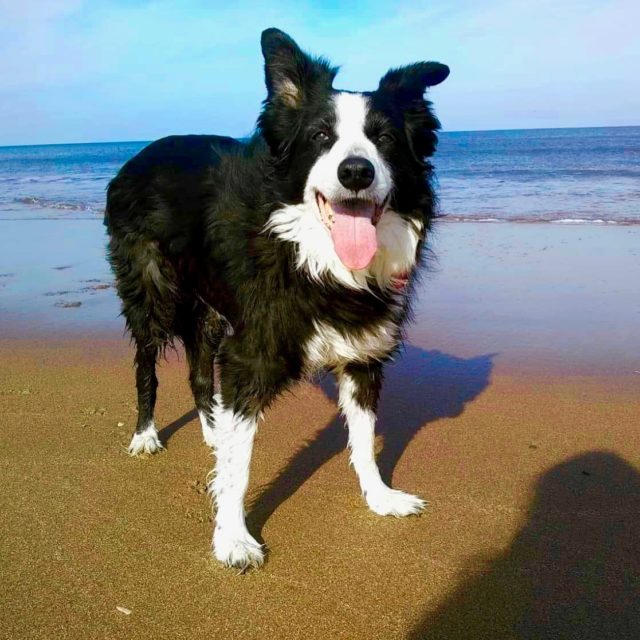
Laura
Writer and Border Collie Mom
Laura is a dog-lover with an animal-related degree and plenty of hands on experience. She is passionate about dog health & welfare and wants to arm owners with all of the essential info they need!

